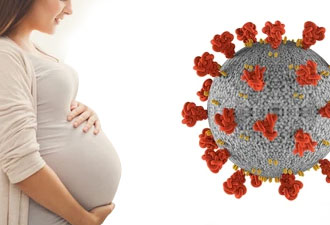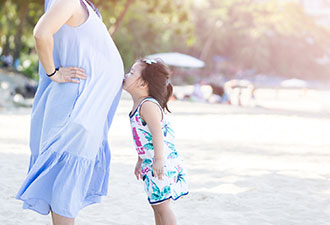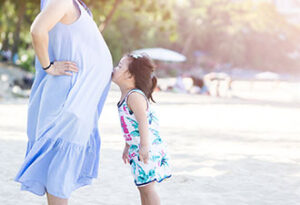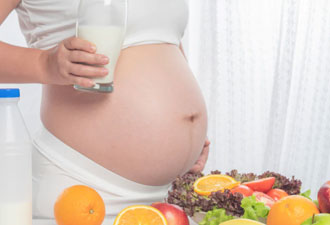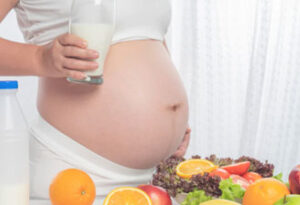Dr. Amelie Hofmann-Werther extends her expert advice on COVID-19 and Pregnancy
Dr. Amelie Hofmann-Werther, Specialist Gynaecology and Obstetrics extends her free advice during the Covid-19 pandemic for Mothers-to-be. Be informed about what to expect and how to be prepared during a worst case scenario.
Dr Amelie Hofmann-Werther is a German board-certified gynecologist and obstetrician with over 12 years of experience in fetal medicine and prenatal ultrasound diagnostics, high-risk pregnancy management, cytology and dysplasia diagnostics, colposcopic procedures and endocrinology and infertility diagnostics.
Last edit: Apr 18, 2020
* Below data may/may not change in due course of time. This blog is written as a service to assist the community during COVID-19 outbreak. You can reach us using the toll free number (800823) or send an email if you need further information or if you have any questions. You are advised to go through the Disclaimer and Privacy policy in case of any concerns.

Table of Contents
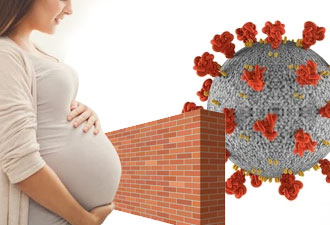
I’m pregnant. How can I protect myself against COVID-19?
Pregnant women should take the same precautions to avoid COVID-19 infection as other people.You can help protect yourself by:
- Washing your hands frequently with an alcohol-based hand rub or soap and water till dry or soap and water for 30 seconds
- Keeping space between yourselves and others and avoiding crowded spaces.
- Avoiding touching your eyes, nose and mouth.
- Practicing respiratory hygiene. This means covering your mouth and nose with your bent elbow or tissue when you cough or sneeze. Then dispose of the used tissue immediately.
- Avoid wearing jewelry, accessories and watches as it is difficult to keep them hygienic
- Husbands are advised to avoid a long beard
What care should be available during pregnancy and childbirth?
All pregnant women, including those with confirmed or suspected COVID-19 infections, have the right to high quality care before, during and after childbirth. This includes antenatal, newborn, postnatal, intrapartum and mental health care. But on top of that, much more patient education and mental support is needed.
Isolation, financial difficulties, insecurity, inability to access support systems are recognized factors putting mental wellbeing at risk. The corona virus epidemic increases the risk of perinatal anxiety, endogene depression, sleep depriviation and malnutrition. It is crucial that support for women and families is strengthened as far as possible.
A safe and positive childbirth experience includes:
- Being treated with respect and dignity;
- Having a companion of choice present during delivery;
- Clear communication by maternity staff;
- Appropriate pain relief strategies:
- Mobility in labour where possible, and birth position of choice.
It is essential that care remains available and accessible to ensure continued support for women with their complex needs.
If I tested positive for COVID-19, can it pass through the placenta or birth canal to my baby?
We still do not know exactly, if a pregnant woman with COVID-19 can pass the virus to her fetus or baby during pregnancy or delivery. There is no evidence so far, that COVID-19 has teratogenic potential, meaning causing any malformation in the fetus.
Vertical transmission i.e. transmission from mother to baby antenatally or intrapartum is so far unknown, presumably there is no. So far no virus could be detected in amniotic fluid or cord blood.
According to a case study published in Frontiers in Pediatrics, there is no evidence that COVID-19 could be transmitted vertically to the fetus from the pregnant mother and cause a clinically significant infection. You can get a PCR COVID test from home by clicking here.
If I tested positive for COVID-19, what are the chances for a miscarriage or any complications?
Regarding a risk of miscarriage or early pregnancy loss related to COVID-19, there is so far not data suggesting an increased risk. Early pregnancy studies with SARS and MERS did not demonstrate a convincing relationship between infection and increased risk of miscarriage or second trimester loss4. There is also no evidence so far, that COVID-19 has teratogenic potential.
Is there a risk for fetal growth restrictions if I tested positive for COVID-19 in pregnancy?
No, there is no such evidence as of now, but in ongoing pregnancies after SARS fetal growth restrictions were observed. There is a recommendation for serial growth scans every 2-4 weeks in suspected cases, depending on the week of pregnancy at time of infection and gestational age.
How do I distinguish between a fever related to my pregnancy or to COVID-19?
The symptoms to ask about are: fever ≥37.8 AND at least one of acute persistent cough, hoarseness, nasal discharge/congestion, shortness of breath, sore throat, wheezing or sneezing. Women with an isolated fever should be investigated, including sending a full blood count. If lymphopenia is identified on the full blood count, testing for COVID-19 should be arranged.
Do pregnant women with suspected or confirmed COVID-19 need to give birth by caesarean section?
No. COVID-19 infection itself is not an indication for caesarean section. WHO advice is that caesarean sections should only be performed when medically justified. The mode of birth should be individualized and based on a woman’s preferences alongside obstetric indications.
At what week of pregnancy is delivery recommended in a term pregnant woman with confirmed COVID-19? Do you suggest induction of labor?
COVID-19 infection itself is not an indication for delivery, unless there is a need to improve maternal oxygenation. The timing and mode of delivery should be individualized, dependent mainly on the clinical status of the patient, gestational age and fetal condition. In the event that an infected woman has spontaneous onset of labor with optimal progress, she can deliver vaginally. Shortening the second stage by operative vaginal delivery can be considered if there is a need to improve maternal oxygenation or a woman’s respiratory condition demands urgent delivery.
Can I still have pain relief and an epidural in labour?
Yes. There is no evidence that epidural or spinal analgesia is contraindicated in the presence of corona virus. Epidural analgesia may be recommended in labour, to women with suspected or confirmed COVID-19 to minimize the need for general anaesthesia if an urgent delivery is needed.
Airborne Infection Isolation Rooms should be reserved for patients undergoing aerosol-generating procedures. There is no evidence that the use of Entonox is an aerosol-generating procedure (AGP). Entonox should be used with a single-patient microbiological filter.
Can I still request delayed cord clamping?
Yes. Given a lack of evidence to the contrary, delayed cord clamping is still recommended following birth, provided there are no other contraindications. The baby can be cleaned and dried as normal, while the cord is still intact. The neonatal team should be informed of plans for the birth of the baby of a woman affected by moderate to severe COVID-19 as far in advance as possible and should also be given sufficient notice at the time of birth, to allow them to attend and secure PPE before entering the room/theatre.
What could be potential risks of delayed cord clamping?
An extended exposure of the newborn to the confirmed/suspected COVID-19 mother as the distance of separation would be less than < 1 meter.
Can my birth partner be present during the birth?
Yes. Asymptomatic birth partners should adhere to hygiene guidelines. If symptomatic, birth partners should remain in self-isolation and not attend. Women should be advised to identify an alternative birth partner in advance, should the need arise. Husbands are advised to avoid long beard.
Is a surgical mask adequate or is it recommended to wear P3-masks for during active labor?
Most guidelines recommend using a FFP3 or N95 respirator if attending to a delivery of a confirmed/probable/suspected COVID-19 patient. For all other patients, we recommend the use of a surgical mask as in all other clinical areas.
Can I breastfeed my baby if I’m COVID-19 positive?
Yes. Women with COVID-19 can breastfeed if they wish to do so. Currently, the primary concern is not whether the virus can be transmitted through breast milk, but rather whether an infected mother can transmit the virus through respiratory droplets during the period of breastfeeding. So the main risk of breastfeeding is the close contact between the infant and the mother. The risks and benefits of breastfeeding, including the risk of holding the baby in close proximity, should they be infected, needs to be discussed with the parents. Some guidelines recommend a temporary separation of mother and baby if the mother is tested positive. This is currently the recommendation US, China, Singapore, HK. Rooming-in for PUI’s requires special precaution to limit viral spread to the baby:
- Wash hands before touching the baby, breast pump or bottles.
- Avoid coughing or sneezing while feeding.
- Consider wearing a face mask and gloves while feeding or caring for the baby.
- Where a breast pump is used, follow recommendations for pump cleaning after use.
- For babies who are bottle fed with formula or expressed milk, strict adherence to sterilization guidelines is recommended.
- Where mothers are expressing breast milk in hospital, dedicated pumps to be used.
In limited case series reported to date, no evidence of virus has been found in the breast milk of women infected with COVID-19; however, it is not yet known if COVID-19 can be transmitted through breast milk (i.e., infectious virus in the breast milk).
Should I continue with my pre-natal visits during COVID-19 lockdowns?
Maternity care remains essential in times of social distancing. Antenatal & postnatal care based on years of evidence aim at keeping mothers and babies safe during pregnancy and childbirth. Women not attending or being deprived of antenatal services are known to be at increased risk of adverse perinatal outcomes including maternal morbidity, stillbirth, depression and others.
Women should therefore be encouraged to adhere with antenatal care guidelines and screening recommendation despite being advised to otherwise strictly engage with social distancing measures.
There may be a need to reduce the number of antenatal visits or replace face-to-face visits by online consultations, but visits should not be reduced without agreeing so first with the treating healthcare provider or facility. This should be communicated with the patients taking into account available evidence on the safe number of visits required.
If a routine scan or visit is due, patients should contact the maternity unit or clinic for advice and to agree on a plan. Scans should be prioritised in the following order:
- Anomaly scan at 18+0 -23+0 weeks
- Ultrasound +/- screening at 11+2 -14+1
- Growth scans
Patients should be encouraged to attend antenatal care unless they meet current self-isolation guidance for individuals and households of individuals with symptoms. For women who have had symptoms recently, appointments can be deferred until 7 days after the start of symptoms, unless symptoms persevere. For women who are self-isolating because someone in their household has possible symptoms of COVID-19, appointments should be deferred for 14 days.
The symptoms to ask about are: fever ≥37.8 AND at least one of acute persistent cough, hoarseness, nasal discharge/congestion, shortness of breath, sore throat, wheezing or sneezing. Women with an isolated fever should be investigated, including sending a full blood count1. If lymphopenia is identified on the full blood count, testing for COVID-19 should be arranged.
Clinics should develop a system to flag women who have missed serial appointments, which is a particular risk for women with other children who may become repeatedly unwell or can’t be left unmonitored. Any pregnant who has a routine appointment delayed for more than 3 weeks should be contacted proactively by the clinic.
Does prenatal corticoid treatment in COVID patients worsen their condition?
For preterm cases requiring delivery, we urge caution regarding the use of antenatal steroids for fetal lung maturation in a critically ill patient, because this can potentially worsen the patients clinical condition, based on data from MERS. An individualized decision needs to be made based on maternal and fetal condition an gestational age.
Should I be worried about COVID-19 at the hospitals when delivering my baby?
When a woman with confirmed or suspected COVID-19 is admitted to the delivery ward, the following staff should be informed: consultant obstetrician, consultant anaesthetist, midwife-in-charge, consultant neonatologist, neonatal nurse in charge and infection control team.
If the women is confirmed to be COVID-19 patient, she may not be admitted to the regular delivery ward as some hospitals have prepared special isolated delivery rooms.
Efforts should be made to minimize the number of staff members entering the room and units should develop a local policy specifying essential personnel for emergency scenarios. The use of personal protective equipment (PPE) should be in line with the guidelines for the current COVID-19 pandemic.
With regard to mode of birth, an individualized decision should be made, with no obstetric contraindication to any method except water birth.1 Caesarean birth should be performed if indicated based on maternal and fetal condition as in normal practice.
Given the rate of fetal compromise reported in the two Chinese case series the current recommendation is for continuous electronic fetal monitoring in labour. There is currently no evidence to favour one mode of birth over another. The mode of birth should be discussed with the patient, taking into consideration her preferences and any obstetric indications for intervention. Mode of birth should not be influenced by the presence of COVID-19, unless the woman’s respiratory condition demands urgent delivery.
Patients with known or suspected COVID-19 should be cared for in a single-person room. Airborne Infection Isolation Rooms should be reserved for patients undergoing aerosol-generating procedures. There is no evidence that the use of Entonox is an aerosol-generating procedure (AGP). Entonox should be used with a single-patient microbiological filter.
There is also no evidence that epidural or spinal analgesia is contraindicated in the presence of corona virus. Epidural analgesia may be recommended in labour, to women with suspected or confirmed COVID-19 to minimize the need for general anaesthesia if an urgent delivery is needed.
An individualized decision may be required regarding shortening the length of the second stage of labour with elective instrumental birth in a symptomatic woman who is becoming exhausted or hypoxic. Given a lack of evidence to the contrary, delayed cord clamping is still recommended following birth, provided there are no other contraindications. The baby can be cleaned and dried as normal, while the cord is still intact.
The neonatal team should be informed of plans for the birth of the baby of a woman affected by moderate to severe COVID-19 as far in advance as possible and should also be given sufficient notice at the time of birth, to allow them to attend and secure PPE before entering the room/theatre.
Will I be able to see an OB/GYN during my self-isolation?
When a face-to-face visit fails or appointments are missed due to self-isolation, recordkeeping remains paramount. Clinics should appoint a team coordinating patients forced to miss appointments due to self-isolation, reviewing appointments for urgency and either convert them to remote appointments, advice attendance or defer to a later point.
Patients should be encouraged to attend antenatal care unless they meet current self-isolation guidance for individuals and households of individuals with symptoms.
For women who have had symptoms recently, appointments can be deferred until 7 days after the start of symptoms, unless symptoms persevere.
For women who are self-isolating because someone in their household has possible symptoms of COVID-19, appointments should be deferred for 14 days.
Can I touch and hold my newborn baby if I have COVID-19?
Close contact and early, exclusive breastfeeding help a baby to thrive. You should be supported to:
- Breastfeed safely, with good respiratory hygiene
- You should wash your hands before and after touching your baby, and keep all surfaces clean at home. Consider wearing a face mask and gloves while feeding or caring for the baby.
- Some maternity units recommend breast pumping and offering the milk to the newborn by the partner or other family members to decrease the risk of infection from close contact with the mother during direct breastfeeding
Can I access any type of Newborn care and Postnatal Care for Mother and baby at home after Delivery?
As the majority of both clinics and hospitals are following the guidelines from our authorities and the government, home sessions with professionals is not recommended due to precautions taken in line with COVID-19.
You can schedule online teleconsultations with Midwifes and pediatric nurses and if needed with a Doctor as well, you will be dedicated a certain amount of time with the professional on the phone. Start with giving a brief history of;
- Type of pregnancy (normal/complicated)
- Type of delivery
- Date of delivery (hospital and doctor)
- Birthweight baby
- Any medical interventions done after delivery for Mother or baby?
- Feeding method at the moment (breastfeeding/formula)
- Most recent weight measured-?
The session will then continue as a normal consultation visit at home or in a clinic, with the client having chance to ask questions about her newborn baby, physical and psychological health and recovery or simply just ventilate for some time.
The professional might decide that a follow up session is needed after a certain amount of days, packages is normally available with a reduces price/ session.
A good advice is to make sure that you are prepared for the session, take a pen and paper and write down all questions that you might have, you can also take notes during the session. Try to schedule the time when the baby is settled (if possible) to make the best time out of it, but all midwifes and professionals are flexible and if the session end being chaos you can simply reschedule at a more suitable baby-time.
The professional might ask for pictures or videos to be sent for certain follow up, or for the purpose of a more detailed anamnesis and as part of the assessment plan.
One to one sessions are available for online preparation and education, join as a couple or just yourself. Theses sessions will help you getting both physically and psychologically prepared for your upcoming birth and labor.
Schedule an hour session to talk about your topic of choice or sign up for a full class to make sure you cover everything from last stage in pregnancy, labor/delivery, first time with a newborn, breastfeeding and a lot more…

